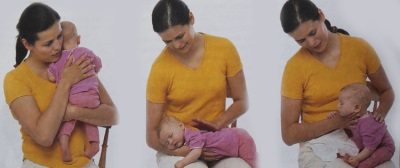Why does the baby regurgitate during and after feeding?
With the regurgitation of the baby after eating - both when breastfeeding and when eating the mixture - every mother faces. Most often, regurgitation is a normal physiological condition that the baby “outgrows” over time. But sometimes it is a symptom of the disease, forcing parents to see a doctor. Why does regurgitation occur and what should parents do?
The reasons
Regardless of the manner in which breast milk is eaten, the baby sucks in the air, which causes discomfort and gives a false sense of satiety. For release from him and need regurgitation. With the proper technique of breastfeeding regurgitation in a child is not very often.
Another most common cause of regurgitation is overfeeding the baby with milk. Excess nutrition is removed from the stomach of the crumbs in a natural way.
When breastfeeding
Burping in babies can also occur due to:
- Digestive disorders. For example, colic or constipation can prevent food from moving normally along the digestive tract.
- Invalid breastfeeding techniques. The baby incorrectly captures the nipple and swallows a lot of air along with the milk.
- Problems with esophageal sphincter. In infants the muscles of this sphincter are poorly developed and are finally formed only by the year.
- Incorrect adult behavior. Baby immediately after feeding can not be strongly pumped, pressed, turned on its side, and so on.
- Diseases of the nervous system and other pathological changes.
Bottle feeding
The reasons in this case are practically the same as in children receiving mother's milk. The main factor causing regurgitation is overeating. At the same time, the volume of food consumed by the artificial isthmus is much easier to adjust.
You may not be holding the baby or the bottle when feeding. About, how to feed a babyread in another article.
Also, the baby can regurgitate if the mixture does not suit him. Check with the pediatrician and pick up the baby other nutrition.
Many: regurgitation "fountain"
Such regurgitation should cause concern to the mother - if the baby spits up so often, you should show the child to the doctor.
Scarce can belch the fountain:
- if the baby is premature as it has an immature digestive system;
- in case of unsuccessful replacement of breastfeeding mixture;
- due to colic and deformities of the internal organs of the baby, when there are obstacles to the promotion of food.
- due to difficult childbirth: oxygen starvation during childbirth or partial damage to the nervous system. Over time, this must pass.
If the child is gaining weight well, he has normal stool and urination and there are no other factors to worry about, do not worry, even if he spits up often enough.
How to help the baby?
In the process of feeding, the air inevitably gets into the crumbs of the stomach, which is the cause of regurgitation. To reduce burping of milk or formula in a baby, the parent should help the baby get rid of the air. Air bubbles trapped in the digestive system lead to discomfort and pain in the abdomen, as well as “blame” for the false feeling of satiety. That is why it is important to help crumble to burp air.
Tips for parents:
- Even if the baby fell asleep by the end of feeding, gently move him to an upright position. Also spitting up the air will help laying the baby to sleep on the stomach.
- Follow the correct feeding technique of the baby from the bottle. Let the mixture fill the entire nipple and not flow too fast.
- Feed the toddler should be in a reclining position so that the head of the child was slightly raised.
- Try to feed the baby in a calm atmosphere and not be distracted. If the baby breaks away from the bottle or breast, more air will be swallowed.
- Give the baby food on demand, as a very hungry baby eats quickly and swallows more air.
- If in the process of feeding the baby began to show their discontent and behave restlessly, perhaps the reason was the swallowing of air. It is necessary to interrupt the feeding and help the baby to burp.
- Often, the crumbly spit up air in the stomach almost immediately after the meal, but sometimes it takes more time. Parents should be patient and make sure that they helped the baby get rid of excess air.
There are three ways to help the baby to burp air:
- Putting the crumb on his shoulder. Take the baby on your hands in a vertical position so that the crumbs head is above the mother's shoulder. With one hand, hold the baby under the booty, and with the other, iron the baby's back. Walk around the room with the baby in this position for a few minutes. Do not forget to put a towel on your shoulder to protect your clothes.
- Putting the baby on your knees. The child should be lying on your knees face down - let the baby’s tummy be located above her mother's knee. With one hand, hold the head of the toddler, and the second, iron his back. Cover your knees with a towel to protect your clothes.
- "Putting" the baby on your lap. Slightly bend the crumb forward and make sure that the back of the toddler remains straight. One hand should be placed under the chin of the baby, and the second one should be stroked on the back of the baby.
When do you need to worry?
A child should be shown to a pediatrician if:
- The amount of food that the baby spits out is very large. The normal amount of regurgitated milk is 2-4 tablespoons.
- The child has a distended stomach and had a chair for a long time.
- The baby cries and bends during burping.
- The mass that the kid burped changed color or smell.
- After regurgitation, the temperature rose.
- The child is already one year old, and the regurgitation has not stopped.
And, of course, if you suspect that the baby does not regurgitate, but vomiting. We advise you to read the article about vomiting after feeding.
It is especially important to pay attention of the doctor to the fact of frequent regurgitation, if the crumb does not gain weight. Poor weight gain indicates that a child does not receive enough nutrients. The causes of frequent regurgitation and simultaneous weight loss can be abnormal development of the digestive tract, lactose intolerance, infectious disease.
Important Tips
- When the baby is in a hurry, he swallows a lot of air with milk, so feed the baby on demand, before he gets hungry.
- When feeding, keep your baby in a semi-vertical position.
- Keep the bottle at an angle so that the milk completely fills the nipple and there is no room for air in it.
- When feeding a baby from a bottle, choose a nipple that will provide the optimal speed of milk flow.
- When the bottle is tilted, the liquid should spill out occasionally. This will indicate that the hole is correct.














